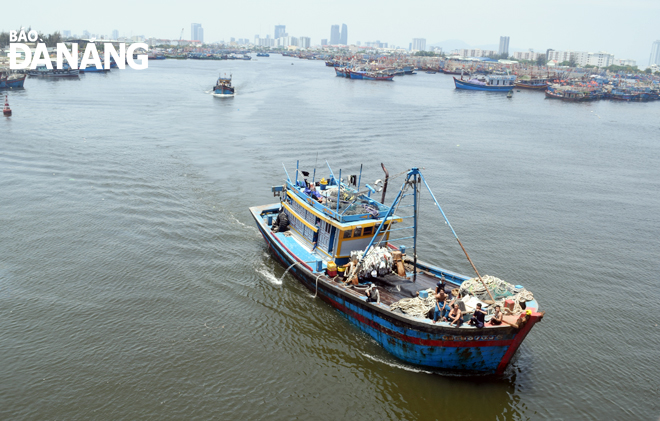Local fishermen continue fishing in Viet Nam's waters despite China's ban
Fishermen from Da Nang, and the central region as a whole, are strongly showing their determination to continue fishing in Viet Nam's waters to earn their living as well as to protect the country’s sacred sovereignty over its sea and islands despite China’s unilateral decision on fishing ban in the East Sea from 1 May to 16 August.
 |
| Many fishing vessels leaving the Tho Quang Wharf for the rich Hoang Sa fishing grounds |
Since early May, bustling atmosphere has been seen at the Tho Quang Fishing Wharf as dozens of offshore fishing vessels from Da Nang, and other central regional localities, have continuously berthed or left the wharf.
Fisherman Huynh Quoc Viet from Son Tra District’s An Hai Bac Ward who is the owner of fishing boat DN-90729-TS said he has conducted a total of 9 offshore fishing trips since the start of the year. He affirmed that China’s recent ban on all fishing activities in the East Sea is totally worthless. He, therefore, remarked that he would continue conducting fishing activities in the Hoang Sa waters in a bid to protect the national security and sovereignty over its sea and islands.
Fisherman Le Cong from the district’s Nai Hien Dong Ward determinedly said that he and his crew members were not frightened by China’s illegal ban and still head out to sea normally.
Meanwhile, Mr Nguyen Tu from Quang Ngai Province’s Duc Pho District expressed their strong discontent with China’s annual unilateral ban. He said he and other fishermen confidently continued their fishing trips in Viet Nam’s territorial waters to earn a living to support their families and protect the country’s sacred sovereignty regardless of China’s illegal move.
Mr Luu Van Khanh, the Head of the municipal Fisheries Department, said China’s unilateral ban seriously infringes the 1982 United Nations Convention on the Law of the Sea (UNCLOS). He said that the local border guards have always kept around the clock contact with local fishermen operating at sea in order to help them if needed, and encourage them to confidently continue their fishing activities.
Mr Khanh asked the fishermen to immediately report to the local border guards and other local relevant agencies any strange moves by the Chinese vessels in order to timely deal with them.
By HOANG HIEP - Translated by MAI DUNG